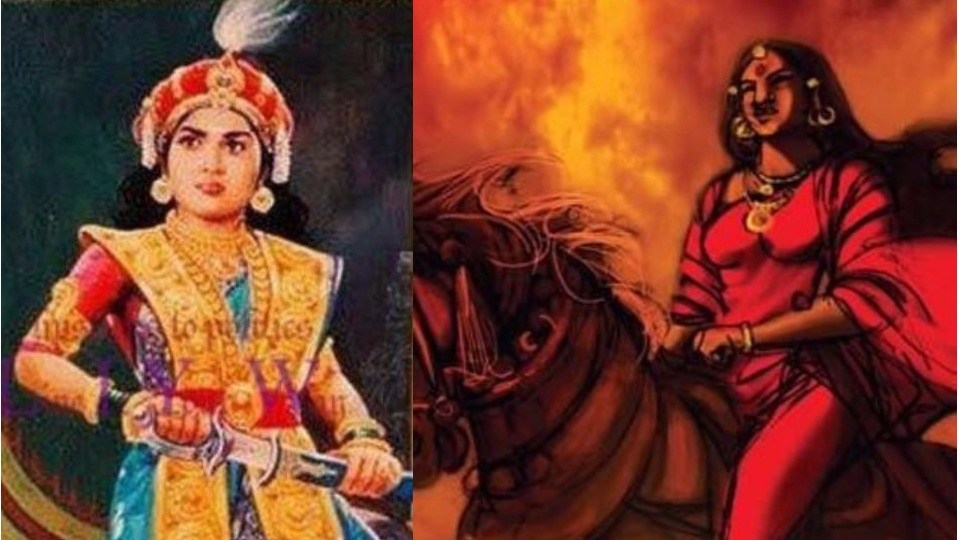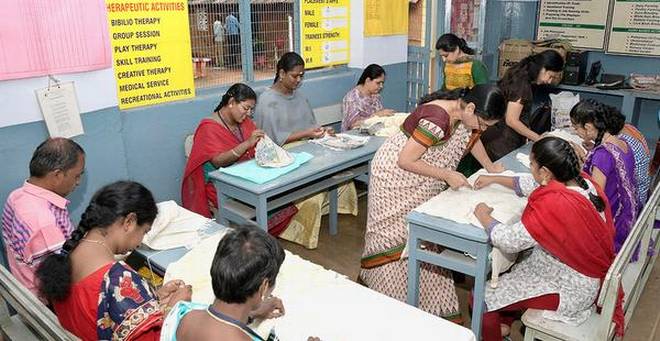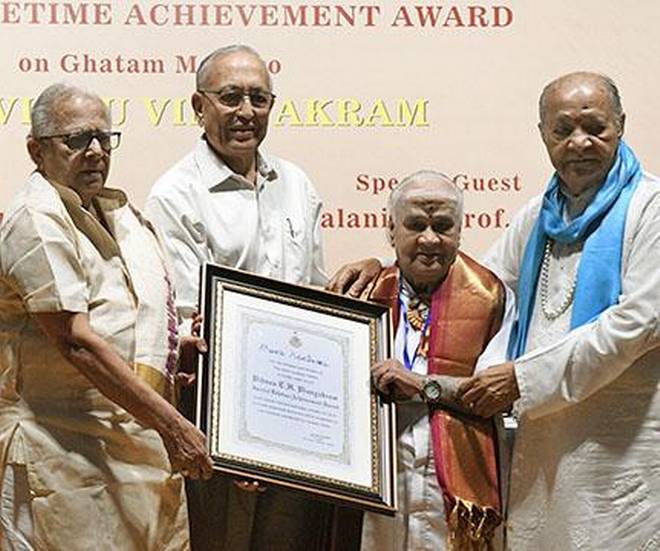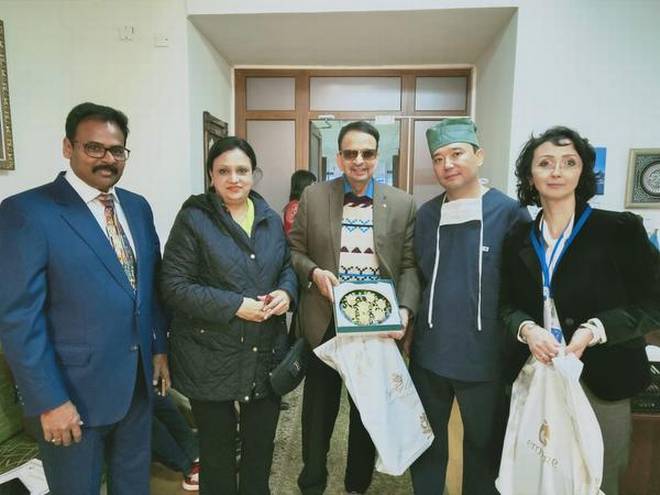Monthly Archives: October 2018
25 a
Velu Nachiyar: The Tamil Queen Who Fought Away the British | #IndianWomenInHistory
Velu Nachiyar, the little-known queen from Tamil Nadu, was the first Indian ruler to fight and triumph against the British. She did this in 1780, 77 years before the First War of Independence. Popularly known as ‘veeramangai’ (brave woman), she also devised the first recorded suicide bombing in history, with her Dalit commander-in-chief Kuyili.
Early Life
Born in 1730 to Raja Chellamuthu Vijayaragunatha Sethupathy and Rani Sakandimuthal, she was an only child. The royal couple thus raised her as they would have raised a male heir. She was trained in horse-riding, archery, and martial arts such as valari (throwing sickle) and silambam (fighting with a stick). She was also well-versed in several languages, including English, French, and Urdu.
SHE DEVISED THE FIRST RECORDED SUICIDE BOMBING IN HISTORY, WITH HER DALIT COMMANDER-IN-CHIEF KUYILI.
When she was 16, Velu Nachiyar was married to Muthuvadugananthur Udaiyathevar, the prince of Sivagangai. They had a daughter together called Vellachi, and ruled over the kingdom for over two decades – from 1750 to 1772, until the year that Mathuvadugananthur Udaiyathevar was killed by the British.
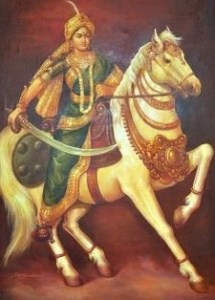
Years Of Stay In Dindigul
After the British invaded Sivagangai with the son of the Nawab of Arcot and killed Velu Nachiyar’s husband in what is known as the ‘Kalaiyar Koil War’, she was forced to flee her kingdom with her daughter. She found safe haven at Virupachi in Dindigul, and lived there for eight years under the sanctuary of Gopala Nayaker.
During her stay in Dindigul, Velu Nachiyar met Haider Ali, the Sultan and the then ruler of Mysore. She conversed with him in Urdu and highly impressed him with her courage and perseverance. This led to her garnering unwavering support not just from Gopala Nayaker, but also from Haider Ali, who pledged to be her ally in her fight against the British. He even built a temple inside his palace as a sign of their friendship.
She was invited by the Sultan to stay at the Dindigul fort where she was respected like the queen that she was. Haider Ali also provided her with a monthly financial support of 400 Pounds and 5000 infantry and cavalry troops each. All of that combined with the weapons provided by the Sultan, helped Velu Nachiyar assemble a powerful army to drive away the British.
The conquest Over The British
1780 was the year Velu Nachiyar bravely defeated the British in a brilliantly formulated coup. Her intelligence gathering agents found out where the British had stored their ammunition. A suicide attack was then devised to destroy all of it.
1780 WAS THE YEAR VELU NACHIYAR BRAVELY DEFEATED THE BRITISH IN A BRILLIANTLY FORMULATED COUP.
Kuyili, the commander-in-chief, gallantly volunteered to carry out the suicide mission. She doused herself in ghee and set herself on fire before jumping into the ammunition store, destroying every last bit of it. Kuyili is considered by many to be Velu Nachiyar’s adopted daughter, and is the first recorded suicide bomber in history.
Udaiyaal was also an adopted daughter of Velu Nachiyar. She too died in the battle against the British while blowing up their arsenal in another suicide attack. In her memory, the queen built an all-women army and named it after Udaiyaal.
Post War
After her victory over the British, Velu Nachiyar reigned over the Sivangangai kingdom for a decade. She made her daughter Vellachi heir to the throne. The Marudhu brothers, her fellow escapees from the Kalaiyar Koil War, were given administrative positions in the kingdom. To express her gratitude to Haider Ali for his immense and timely help, Velu Nachiyar constructed a mosque and church at Saragani. She further maintained friendly relations with Tipu Sultan, Haider Ali’s son, and loved him like a brother.
Vellachi, Velu Nachiyar’s daughter, succeeded her to the throne and ruled from 1790 to 1793.
The 66-year-old valiant queen passed away in 1796 in Sivagangai, her beloved kingdom. She had been suffering from heart problems and had been treated even in France.
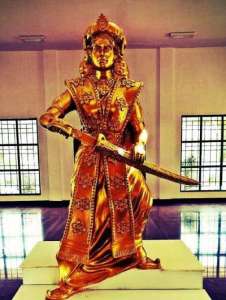
Appreciation And Depictions In Popular Culture
As part of his album ‘Tamilmatic’, Tamil-American hip-hop artist Professor A.L.I. dedicated to Velu Nachiyar a song titled ‘Our Queen’.
On December 31, 2008, a stamp was released in her remembrance.
A grand ballet performance was presented by OVM Dance Academy of Chennai. It narrated the life story of the lionhearted queen. Another grand ballet performance was held in Naradha Gana Sabha in Chennai. The director of the performance, Sriram Sharma, researched on her for about a decade.
The late J. Jayalalitha, former Chief Minister of Tamil Nadu, inaugurated the Veeramangai Velu Nachiyar Memorial in Sivagangai on 18th July, 2014. A six-feet bronze statue of the queen was also erected and it was announced that January 3 would be celebrated as the birth anniversary of the undaunted queen who shattered gender roles as early as the 18th century.
References
source: http://www.feminisminindia.com / Feminism In India – FII / Home> History> Velu Nachiyar / by Hamsadhwani Alagarsamy / October 17th, 2018
Breathing life into the Madurai Sungudi
A group of mentally challenged individuals are breathing life into Madurai Sungudi
Inside the vocational training centre of M S Chellamuthu Trust & Research Foundation, eight women and a man sit at tables working intently on white pieces of cloth. They tie small knots on the fabric with concentration and are a picture of patience. Mentally-challenged, they are part of an innovative project designed to facilitate their rehabilitation.
“When we started teaching them to tie the sungudi knots in September last year, their hands quivered and they could barely hold the cloth to tie the threads,” says Hema Arun Amarnath, a key resource person from local NGO Tharagai. However, recently, three of them were acknowledged as artisans as they received their first payment and also saw their end product, sungudi dupattas, go for sale.
A year ago, Nancy, Vimala and Soundarya wouldn’t have imagined that they would be able to do this. It was the decision of the Trust’s Executive Director R Rajkumari to create a win-win opportunity, where the patients could heal themselves while reviving a dying art.
“People with mental illness are mostly taught candle, agarbatti or papadmaking as vocational skills. But, to involve them in a highly-skilled work to keep the traditional craft of Madurai alive, makes them warriors of art,” she says.
“Nine people were identified for the project based on their clinical status, interest and functional capacity,” points out K S P Janardhan Babu, Director (Projects). “The achievement is big, not only for them, but also their trainers, mentors and caretakers,” he adds.
“For these artisans, art is now central to their being, feeling and thinking,” says Sridevi Suresh, who was instrumental in associating her friends and like-minded individuals in this journey to save a dying art.
“They surprise us,” says volunteer Sumathi Rajan, “by giving us a product that qualifies for sale through Crafts Council of India (CCI). “Sungudi has lent itself well as a therapy for their minds,” adds Babu.
The vocational training centre at Shenoy Nagar is a place without stigma where Anitha, Rajeshwari, Somasundaram, Gayathri, Ramya and Nandhini come from the different rehab centres of the Trust and share camaraderie for three hours every day. “I complete 11 rows every day and each row has 25 knots,” says Rajeshwari, who came for treatment of schizophrenia four years ago. “I am under medication now,” she says, “Tying the knots calm me.”
Says Somasundaram, “I belong to a family of tailors and tying sungudi knots makes me happy,” he says. Nancy says with pride that she completes 72 knots in 30 minutes and has mastered the technique. That is why after a strict quality check, her piece was cleared for sales.
Once the handcrafted piece is approved for the market, the women are paid 10 paise per knot. Every blouse piece contains 800 to 1,000 knots and a sari has a minimum of 5,000 knots.
In the initial weeks of learning, Tharagai provided them small handkerchiefs to practice on. Later, they moved to one metre blouse pieces. Those who improved their knot tying skill are working on saris now. Their work is not time-bound and there is no pressure on them.
“This is a socially-engaging experience for us. We get a deeper understanding of mental health and they are able to reshape their lives,” says Sridevi.
The Tharagai volunteers visit the centre every fortnight to take stock of the progress made by the group.
In the initial days, they came every day with a trainer from Gandhigram and once the members got the basics right, they practised under the supervision of the centre head Bhavana.
Each piece they work on is tagged with their details such as starting date and the number of knots tied and a record is maintained to assess their progress.
The next time you go to Kamala — The Craft Shop of Crafts Council of India in Egmore, check out the authentic sungudi fabrics and saris. This small group has fought many battles to reach there.
source: http://www.thehindu.com / The Hindu / Home> Life & Style / by Soma Basu / October 22nd, 2018
Music Academy honours Vikku
Given lifetime achievement award
Veteran percussionist Vikku Vinayakram was presented with the Special Lifetime Achievement award at a function held here on Wednesday.
Organised by The Music Academy, the event had veteran artists coming together to honour Mr. Vinayakram.
Presenting the award certificate and medal to Mr. Vinayakram, renowned flautist Hariprasad Chaurasia said, “It felt like I was getting the award as I gave the award to Mr. Vinayakram. He is a great musician and has inspired me. We have played together in several concerts.”
Recalling his long association with Mr. Vinayakram’s family, veteran violinist T.N. Krishnan said he exhibited his music talent when he was quite young.
Highlighting the achievements of the awardee, N. Murali, president, The Music Academy, said Mr.Vinayakram personified Indian percussion to global audience and accompanied several stalwarts. His music’s underlying themes were devotion and reverence to art.
Mr. Vinayakram is the third musician to receive special lifetime achievement award from the Music Academy.
source: http://www.thehindu.com / The Hindu / Home> News> Cities> Chennai / by Special Correspondent / Chennai – October 11th, 2018
21
Ophthalmologists get Kazakh honour
Dr. Mohan Rajan and Dr. Sujatha Mohan of the Rajan Eye Care Hospital were honoured by the Kazakhstan Ophthalmic Society.
The Ophthalmologist-duo were honoured as part of the 85th year celebration of the Kazakh Eye Research Institute held in Almaty, recently.
Dr. Mohan Rajan and Dr. Sujatha Mohan were the only Ophthalmologists to represent the country and were awarded for their contribution to Ophthalmic science and education.
source: http://www.thehindu.com / The Hindu / Home> News> Cities> Chennai / by Special Correspondent / Chennai – October 18th, 2018
